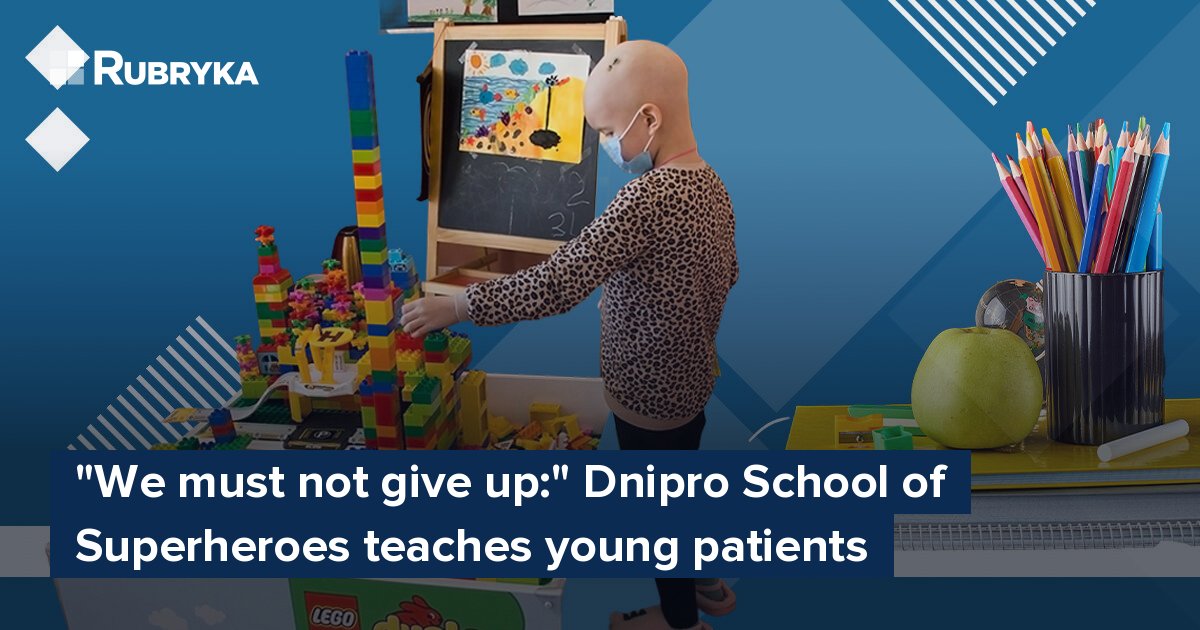
School of Superheroes is a network of free schools in medical institutions attended by inpatients. The state institution was founded in 2022 by the Cabinet of Ministers of Ukraine thanks to the support of the Office of the President and the First Lady. The heart of the educational centers is its curator Nataliia Moseichuk, and the pulse is Yevhenia Smirnova, the founder and now the director of the state institution School of Superheroes. They currently work in Kyiv, Zhytomyr, Lviv, Kharkiv, and Dnipro and are opening in Mykolaiv, Kyiv, and Khmelnytskyi regions.
Rubryka's correspondent visited the Dnipro subdivision and learned how teachers prepare to work with children struggling with diseases, how important learning is for young patients, and what motivates teachers to hold on despite everything.
Olenka
The white corridors are decorated with bright pictures and characters, but hardly any adults would like to see them. Especially — live among them for weeks or months with your child. This is the hematological oncology department of the Regional Family Health Medical Center. Among the many wards and treatment rooms, an educational space for learning was recently created here in a room of several squares filled with textbooks and children's desks.
"This is our Olenka. Did you come to see Oksana Volodymyrivna?"
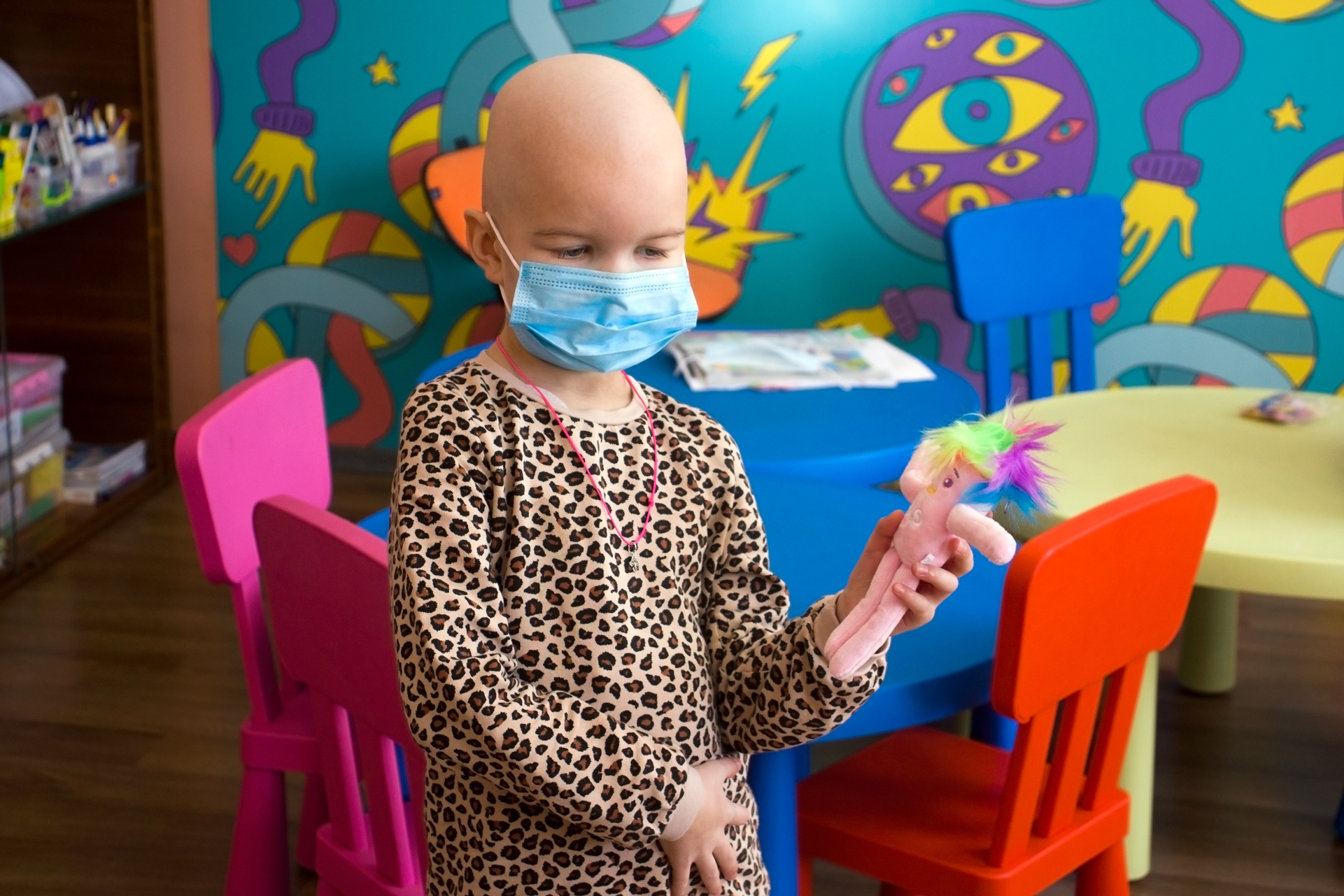
Olenka came to study
A little girl peeks out from behind the door. Her voice is a little hoarse, almost inaudible behind the mask, so the child's answer can only be guessed. Junior school teacher Oksana invites Olena to sit at the desk. She opens a math notebook in front of the child.
"What number did we learn yesterday? Seven. By the way, who is this? What is her name?" the teacher draws attention to the toy held by little white hands.
"A dancing doll. Her legs do not bend," the girl answers.
"Let's sit her next to us," Oksana Volodymyrivna manages to sit the doll. The teacher moves on to exercises in mathematics.
"Come on, we will help Hannusik and Stepanchyk finish the objects, so there are seven of each. Let's count: one, two, three…," the teacher explains the problem to Olenka.
Olenka repeats the numbers after the teacher. With thin fingers, she presses the pencil to the notebook page — with the teacher's help, she draws the seventh object. Oksana Volodymyrivna is following the girl's strokes, sometimes glancing at the child's toy:
"I have a first-grader, Agatha, who has a lot of toy dogs. She brings them all to study and lays them out on the desk. She communicates with me through those dogs when she is in a bad mood," the teacher shares the story of another student.

Olenka is attentively listening to the teacher's explanations
Oksana Volodymyrivna has worked at the School of Superheroes since mid-March. "I really hesitated whether I could cope with this job. I took a course at EdEri on how to teach children in hospitals and an interview and realized that I could do it," says Oksana Volodymyrivna.
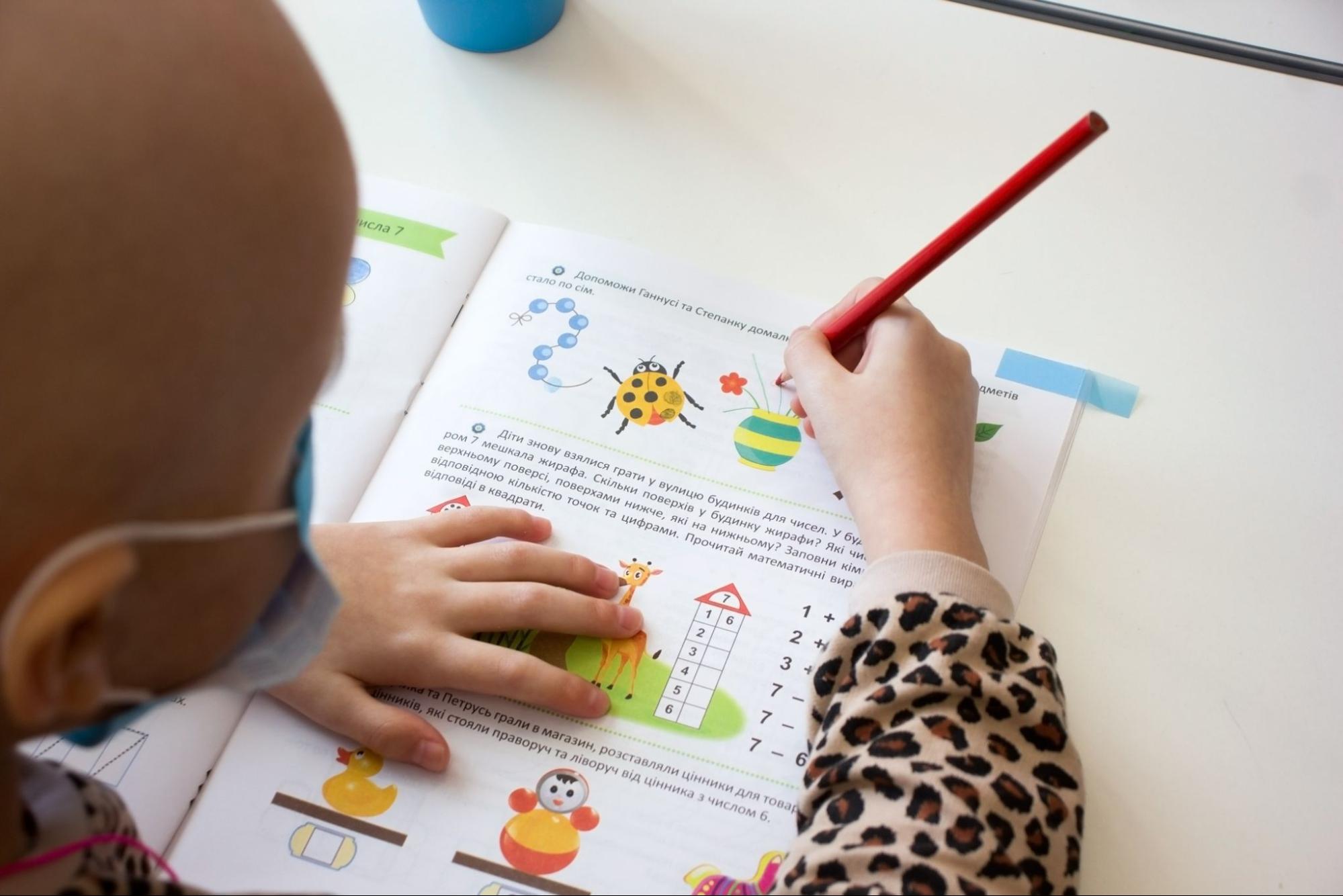
Olenka is doing the tasks, supervised by the teacher.
The teacher says that she was putting together an algorithm for working with children in hospitals. The super teacher tries not to take the most emotionally difficult things out of these rooms. At home, she tries to distract herself so that at work, she can give the children only positive emotions, which are extremely necessary for sick kids. "I try to gather good and positive things outside the hospital's walls and bring them here. I always try to be positive," the teacher explains. "For example, I have a permanent student, Ilyusha. He won't let me go until we finish all the tasks. He always says something nice. 'You are so beautiful today.' Or 'You dyed your hair.' Such a little gentleman. You go to him with a special mood."
Oksana Volodymyrivna works out with Olenka for twenty minutes. It is difficult for a girl, so the teacher lets her play. The little one runs up to the huge tower she built yesterday. Oksana Volodymyrivna puts down her textbook and watches the schoolgirl.
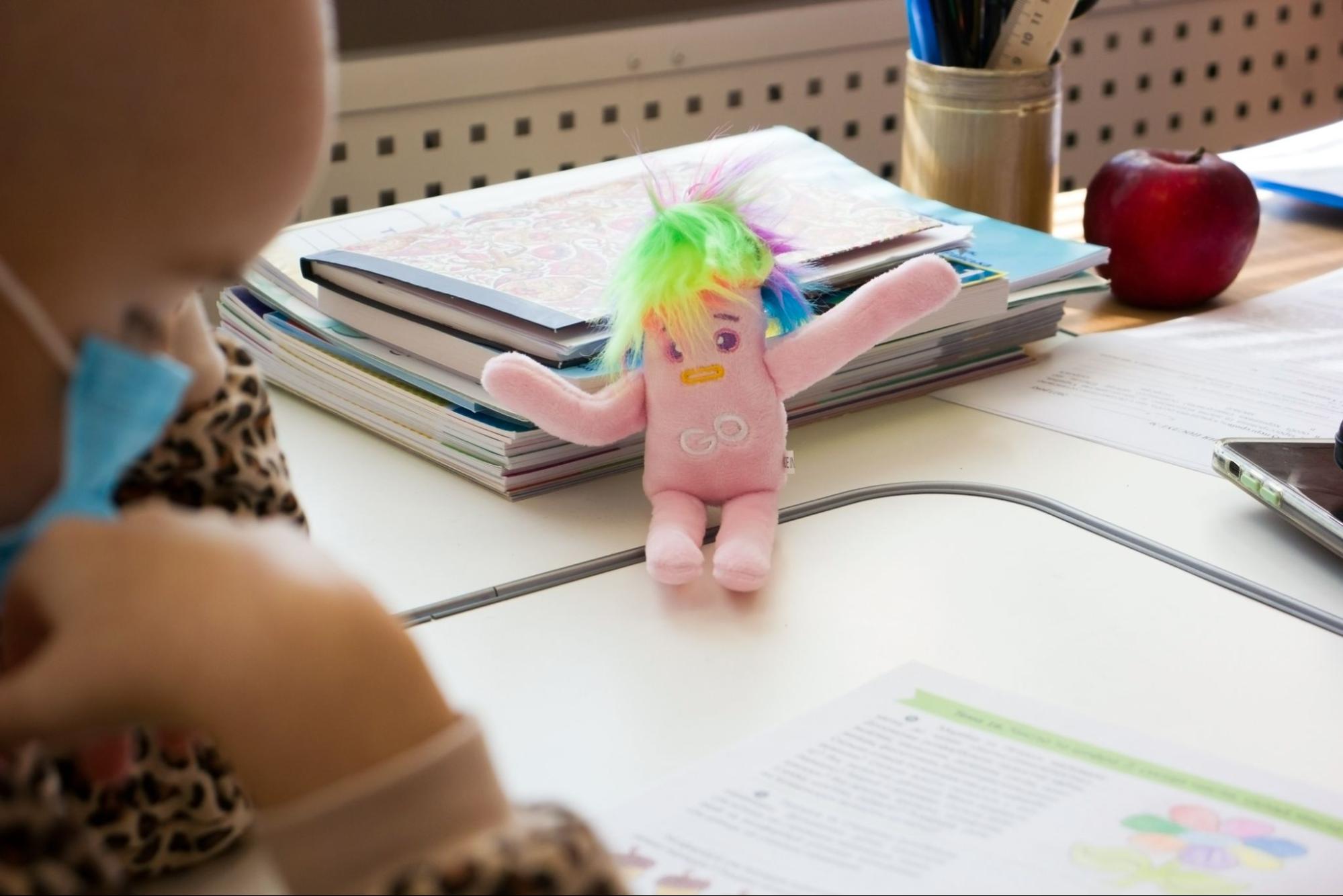
Olenka left her toy on the table
"God gave us Oksana Volodymyrivna," says Nataliia Oliynyk, head of the educational center of the state institution School of Superheroes in the Dnipropetrovsk region.
Oliynyk recalls a story about a patient, Victoria, a second-grader, who spent two months in the hospital, not letting anyone near her, but the second-grader started talking during the second lesson with Oksana Volodymyrivna. She even smiled a little. The last lesson with her was in the middle of the week, but an insidious disease took the child's life in a few days. The next day, Oliynyk offered Oksana Volodymyrivna to go home early since it was stressful for her. The teacher chose something else — she went to the child's mother to be with her.
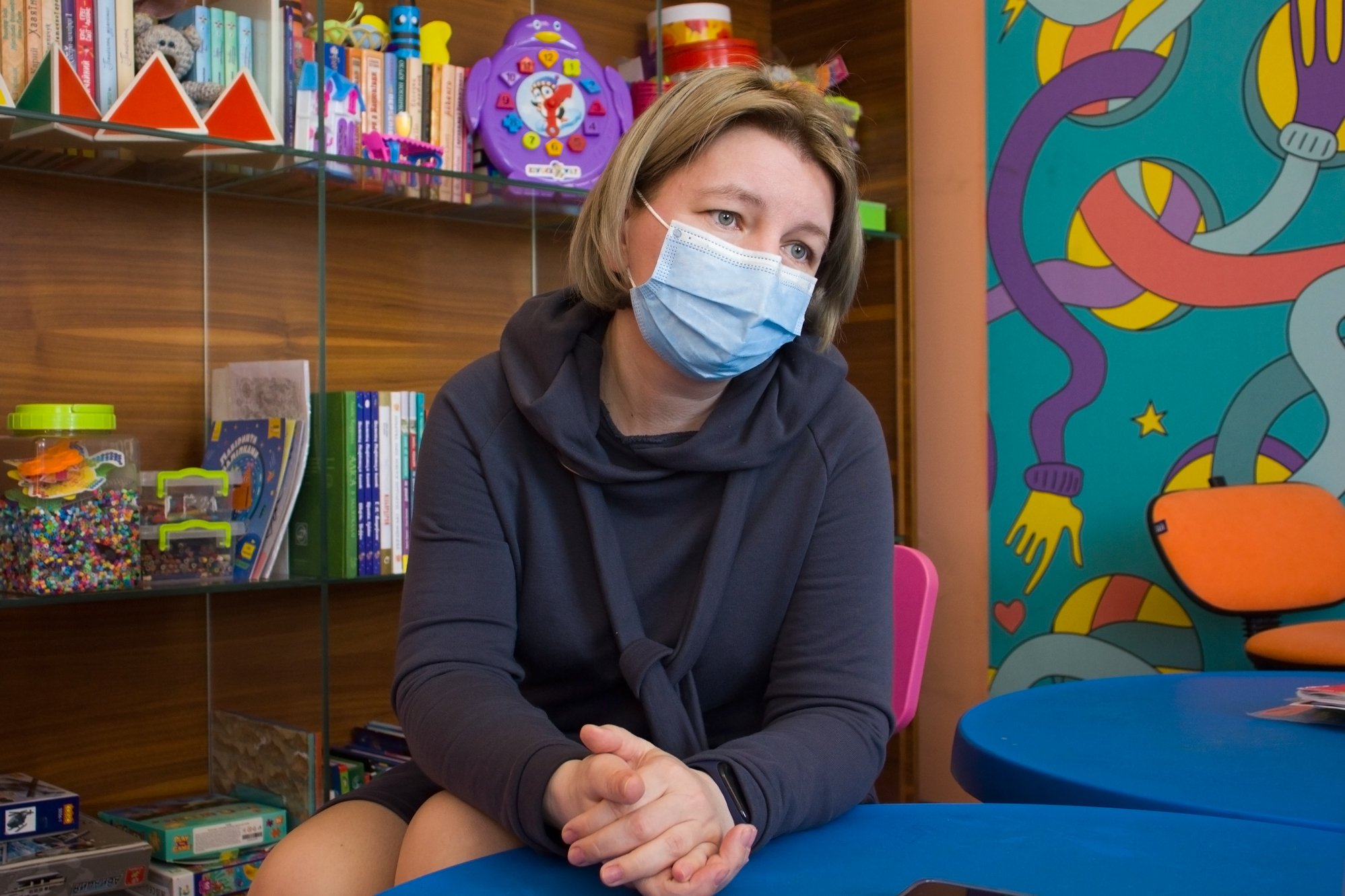
Oksana Volodymyrivna is one of the teachers at the School of Superheroes
"I remembered Vika's eyes and her smile. That little girl had lights in her eyes. This is exactly what I remembered for myself," says Oksana Volodymyrivna.
Superteachers for School of Superheroes
Oliynyk says it took a long time to recruit employees for the educational centers of the Dnipropetrovsk region. She had eight interviews a day that ended way after the working hours. She rejected many applicants because the approach to teaching at the school was serious. Upon entering the classroom, children should forget all their illnesses and live each lesson as a new life.

Oliynyk is sitting at one of the classrooms
This School of Superheroes class is located in the oncology department, and only patients from this department can attend it. Children from other departments study with teachers in the wards, dining room, and hall. Teachers come to them themselves. The second Dnipro division of the school works at the Kryvyi Rih anti-tuberculosis dispensary.
According to Oliynyk, a full staff of teachers has already been recruited for both branches. Some teachers work full-time with children, like Oksana Volodymyrivna, and others come here after their main work.
Currently, in the Dnipropetrovsk region, there is a fully formed main staff in two centers, and 16 teachers work with the school under civil law agreements. Children from the 5th to the 11th grade are provided with all teachers in all subjects: Ukrainian language and literature, mathematics, chemistry, physics, computer science, history, biology, geography, foreign languages, and others. Primary and preschool teachers work with children aged three and over.
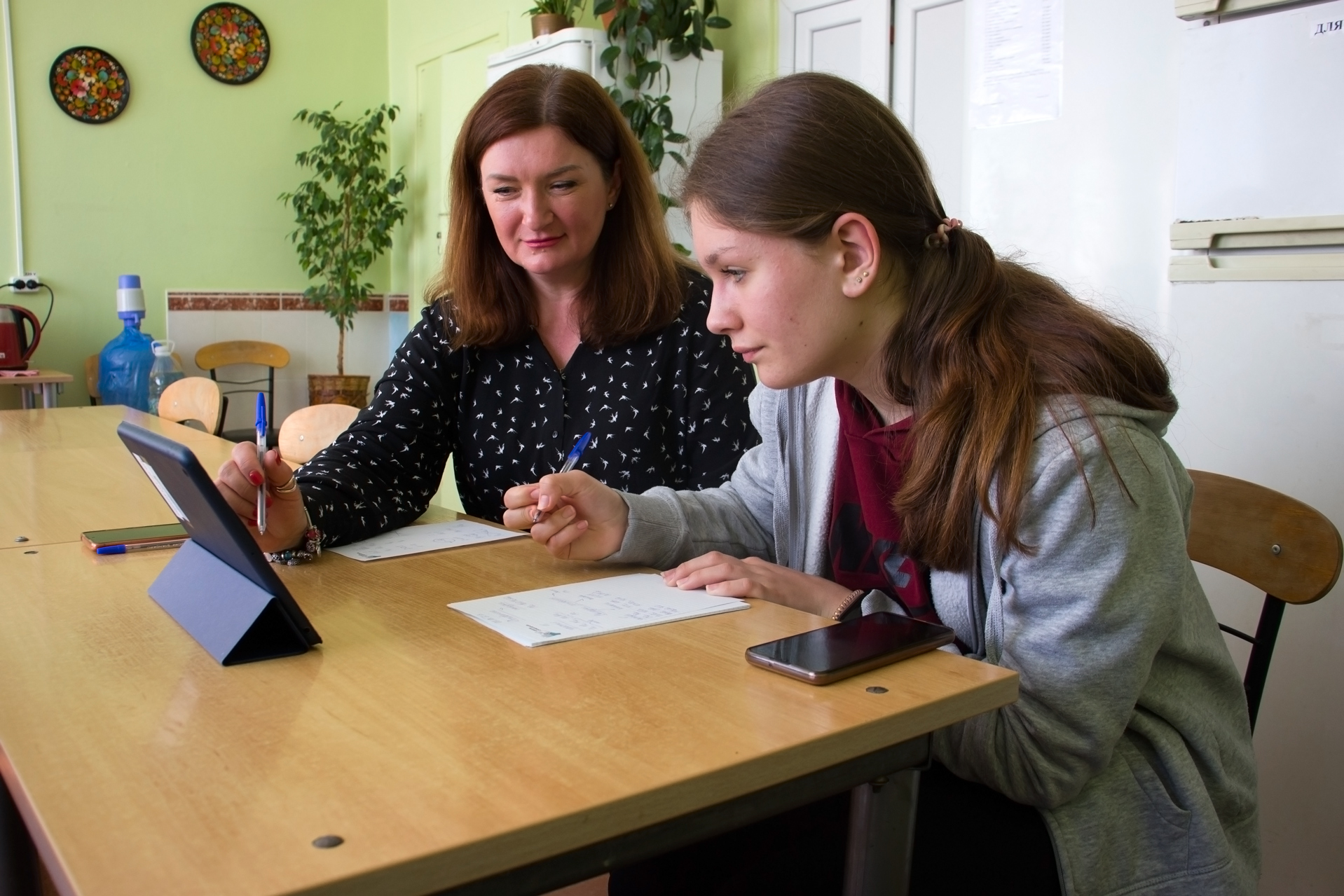
The teacher is holding a class with one of the patients
Training formats can be different: individual, as with Olenka, or group, when a whole class of children is present. There were cases, the teachers recall, when as many as ten students were present in the lesson. There is also distance learning.
"We use the remote format if the child is in the infection box or for other reasons. There was supposed to be a lesson in the first grade, but the boy's leukocytes suddenly dropped. Two other children were sitting in the classroom, and the boy joined the class via Zoom," says Oliynyk.
Children are not ususally graded at the School of Superheroes but can be at parents' request, however there was no such request in half a year of work. At the end of the treatment, a certificate is issued, which states the number of hours of study completed: for example, Ukrainian language — 14, mathematics — 15. This document can be taken to the regular school as proof that the child kept up with the program even during illness.
During registration at the hospital, parents fill out the consent to the provision of educational services, granting permission for the photo. They indicate which grade the child attends and whether a psychologist or speech and language therapist is needed. The teachers at the school are like universal soldiers — they must be ready for anything. The teacher focuses on the curriculum but necessarily analyzes the actual knowledge of the child.

The teachers of the School of Superheroes are ready to work with children in any environment
Oliynyk says the most important thing is not to cut off the child's wings and listen to their needs. Thanks to the individual approach, the School of Superheroes class is constantly visited by schoolchildren — even between classes.
"It happens that children hospitalized in the first half of the day already ask a teacher to come to them in the second half. Another case: we had a boy discharged today. Teacher Iryna came to his room and asked: "You don't need us today?". "Of course we do!" answered the student's grandmother. The child was actually discharged but had a class and only after that went home," says Oliynyk.
Teachers of the School of Superheroes sometimes face the fear of children. They are unfamiliar and fearful in the hospital, especially when an unfamiliar teacher comes to teach not always favorite subjects. But the fear ends with the first lesson.
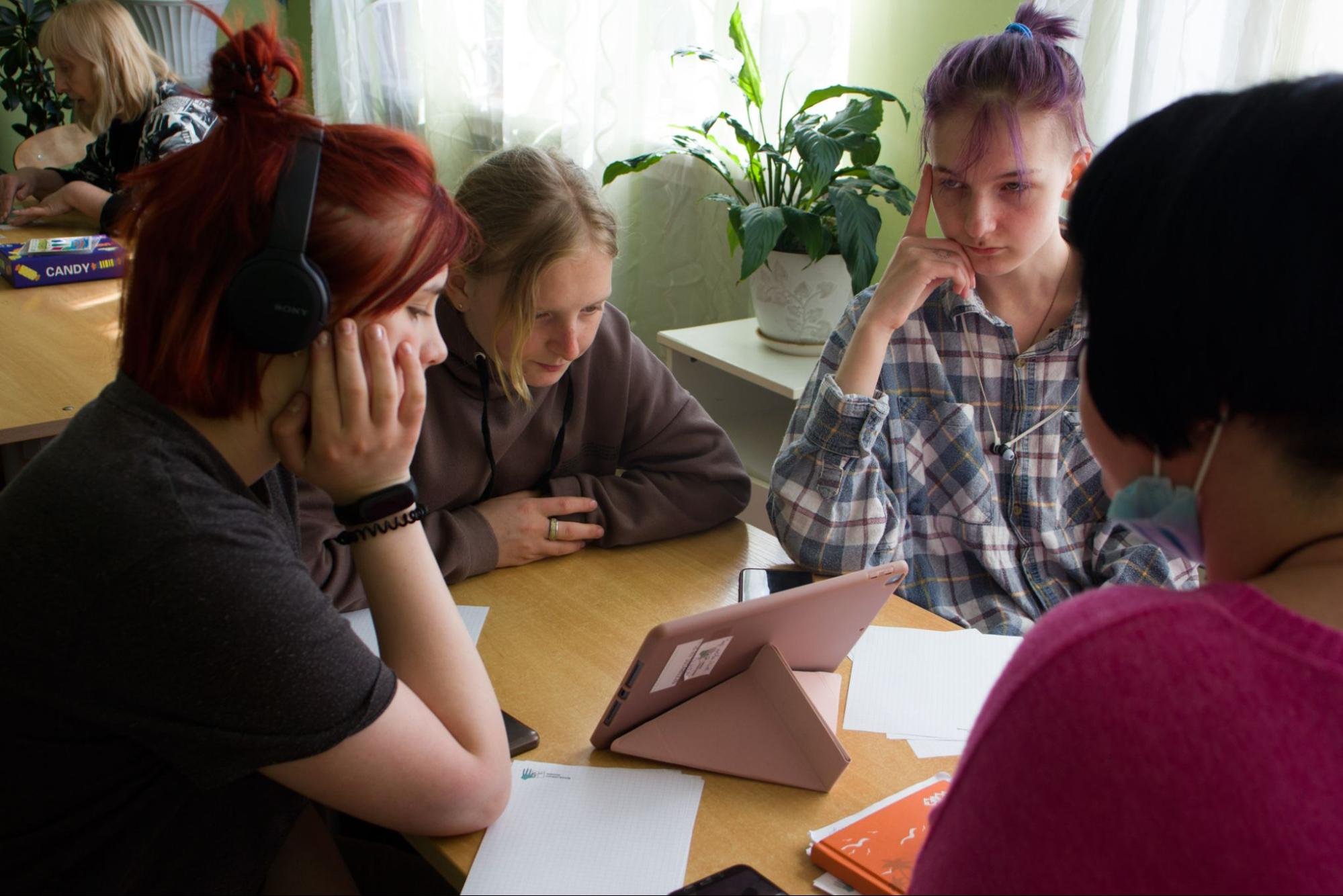
Children are watching an educational video during one of the classes
"Sonya, a ninth grader, second day in oncology. It is obvious that she is afraid. The teacher carefully sat down beside her, talked, and began teaching the lesson. An hour passes, and the girl does not want to leave anymore — she says that during this time, she fell in love with Ukrainian literature. Sonya went to procedures during the day but always returned to class," Oliynyk recounts another case.
The head of the school remembers how second-grader Masha stood and sobbed under the classroom door. The teachers asked what happened.
"It's Friday again, which means you'll be gone tomorrow and the day after…"
Some children ask for the teachers' phone numbers after discharge — to dial immediately when they return to the hospital's walls.
School of Superheroes teachers understand patients' emotions. They are now not only members of the health team but also play the role of bridges between the small world in the hospital ward and the big and exciting outside world. In addition, teachers can support and stimulate interest in learning. When a child is interested in something, they forget about the disease and overcome boredom, says Nataliia Artyomova, deputy medical director for oncohematology and transplantology at the Regional Medical Center for Family Health.

Nataliia Artyomova is the deputy medical director for oncohematology and transplantology at the Regional Medical Center for Family Health
Power of the School of Superheroes
Victoria's child, six-year-old Ariana, is battling acute T-cell leukemia. Now the girl's temperature does not drop, so doctors have completely restricted the child's contact with the environment, including teachers.
"We have been in the hospital for 50 days. The child is so upset today because she cannot study because of her condition. I offered her to study with me, but Ariana doesn't want to," says Victoria.
Arina is engaged in the Intellect program. She missed a little of the educational program due to her health but has already caught up thanks to the teachers of the School of Superheroes.
"For the first weeks, Ariana was in a difficult condition, but when her condition improved, she returned to classes. Mrs. Oksana guides us through our notebooks. My daughter would sit in the classroom from morning until night if possible. They even put IVs here. Of course, you can take the little one for the procedure, but she doesn't want to be taken away from here," says Victoria.
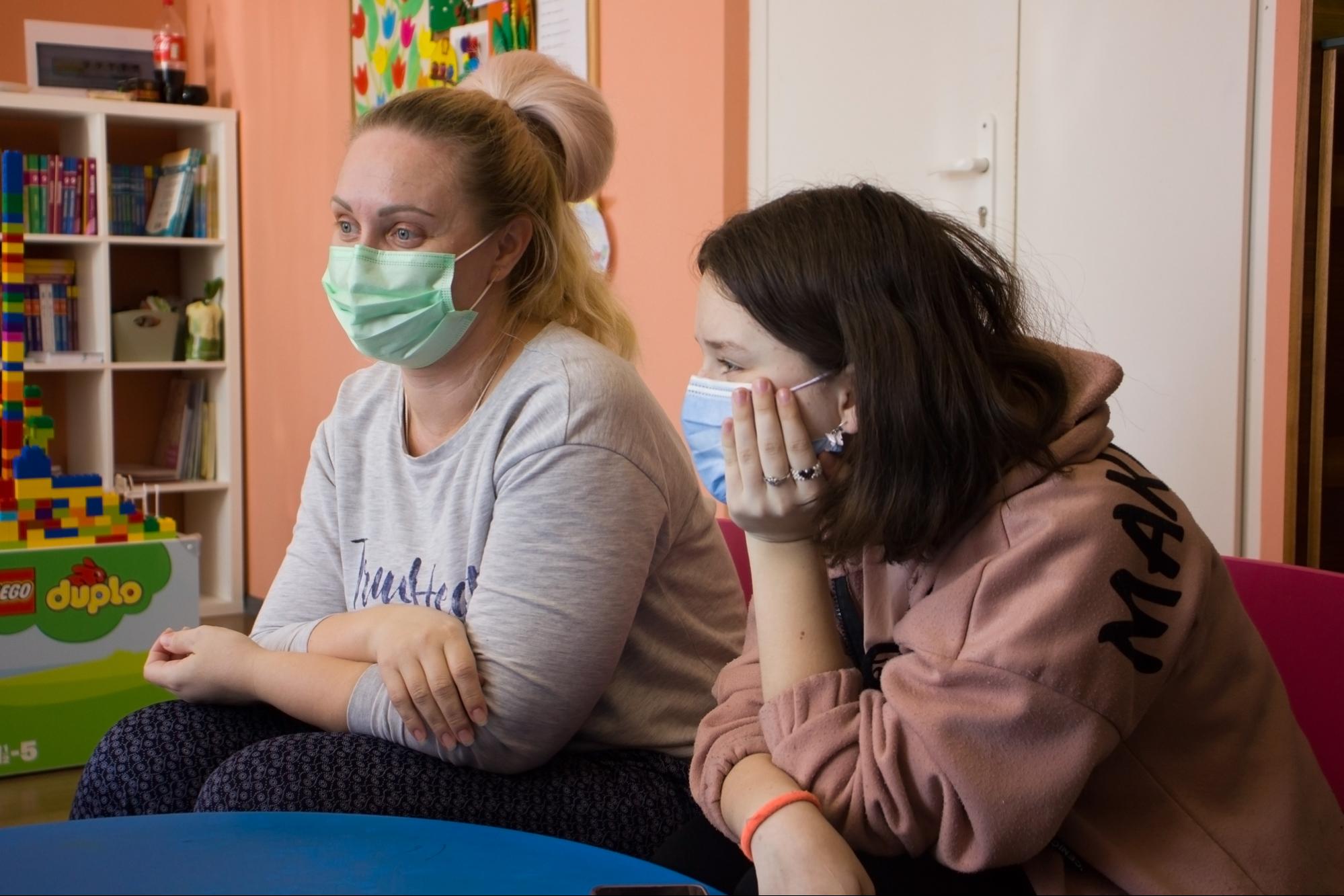
Victoria and Katya visited the School of Superheroes
Victoria is sitting next to Katya — the girl who came for treatment from a village in the Synelnykove district. She is fighting leukemia. Katya's mother is currently looking after Ariana, and the girl is out with Victoria.
Katya says she has been in the hematology-oncology department for about 20 days. The girl also studies at the School of Superheroes, but she admits that there are days when she does not want to immerse herself in classes at all.
"I like mathematics, geography, biology, and English," Katya lists. She says she prefers to make rings from beads in her free time. She shows one of them — a white ring with a small black heart.
Those who have been lost and hope
"We cannot give up," says Oliynyk. "Young patients fight hard for their health and life." The director tells about a girl who was given a puncture without anesthesia, and the next day the schoolgirl came to class but did not finish the lesson — she suddenly felt sick.

The walls of the hospital are decorated with the pictures drawn by the School of Superheroes students
About 250 children passed through the Dnipro units of the School of Superheroes. Among them are those who are no longer among the living. "Our first superhero boy who left the world is Denys. After losing his son, his mother came to school and brought a drawing. "This is Denys's last drawing. He asked me to give it to the School of Superheroes," Oliynyk says.
Now a bright unicorn decorates the corridors of the department. "After chemotherapy, the mother carries the child in her arms because she cannot walk. And the girl wants to study. What right do we have to pretend or make ourselves somehow miserable?" Oliynyk shares. She admits that there were times when she came home after work and sobbed on her knees by the bed, but she says: "You can't give up because our kids need us."
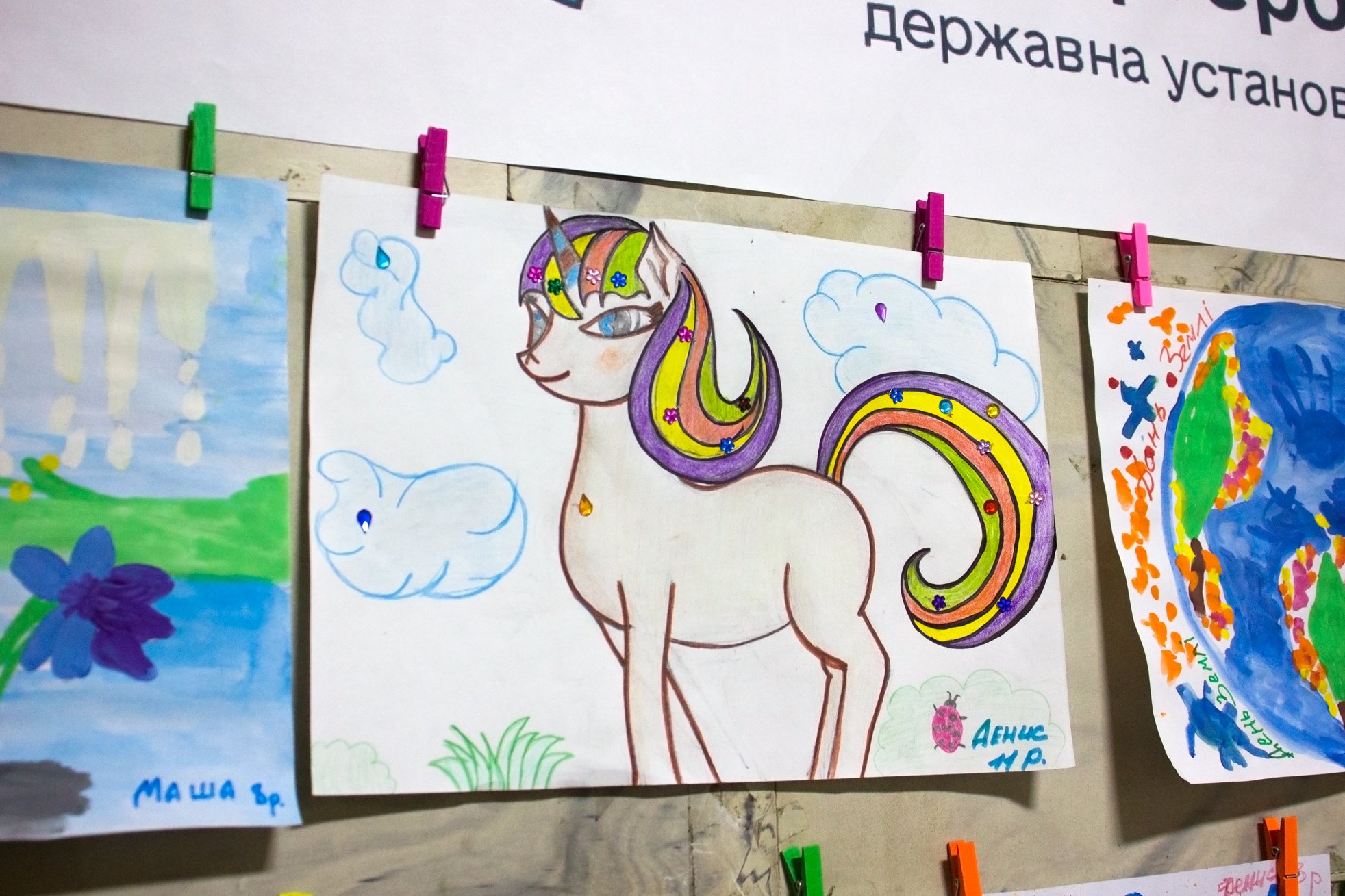
The picture drawn by Denys
Today, these super teachers from the School of Superheroes will finish their shift. They will leave their superheroine costumes, finally take off their masks and walk along Slavy Boulevard in Dnipro to enjoy the abundant flowering of cherry blossoms and tulips. And already tomorrow, they will start their superhero shift again.
Photo: Oleksandra Tkach


